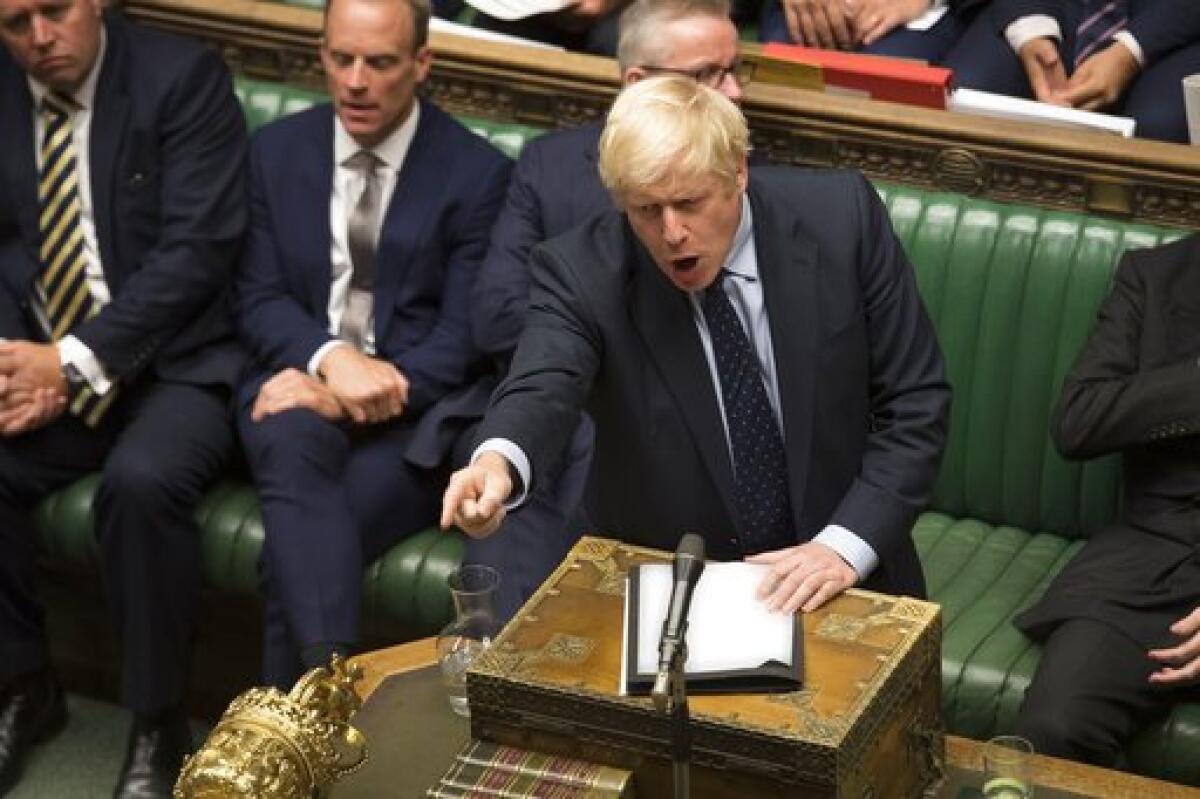Defying Prime Minister Boris Johnson, U.K. lawmakers pass bill to block no-deal Brexit

- Share via
Britain’s messy, drawn-out exit from the European Union — Brexit — has already toppled two prime ministers. Now the tenure of a third leader, Boris Johnson, is hanging by a thread, and there’s new uncertainty over when and how the split with the EU will happen.
In a devastating rebuke to Johnson, who has been prime minister for just six weeks, lawmakers voted Wednesday to prevent him from taking the country out of the multi-nation bloc less than two months from now unless he can first strike a withdrawal deal.
Ultimately, the struggle appears likely to result in a new general election — but not as soon as Johnson would like. Many lawmakers believe he hoped to win an election before the departure deadline Oct. 31 and impose a no-deal exit against Parliament’s wishes.
After complex daylong maneuvering, the House of Commons voted, 327-299, to demand that Johnson either secure a departure accord with the EU or ask for a three-month extension, which would push the withdrawal into next year.
The measure would stave off a damaging no-deal Brexit, a scenario that the prime minister refused to rule out despite predictions that “crashing out” of the bloc would plunge the country into a deep recession and spark shortages of basic foodstuffs and medicines.
The matter isn’t completely settled: The unelected House of Lords still must approve the bill before a five-week Johnson-imposed suspension of Parliament begins next week. Opponents may mount a filibuster to try to prevent final passage.
Despite the parliamentary pounding that the prime minister has taken, he still had one staunch, high-profile backer: President Trump. The U.S. president, who cheered British voters’ 2016 referendum vote to leave the EU, said he was confident Johnson would somehow prevail.
“He’s in there fighting and he knows how to win,” Trump told reporters in Washington on Wednesday. “Boris knows how to win. Don’t worry about him — he’s going to be OK.”
But many British lawmakers were clearly very worried indeed — worried that they could not trust the prime minister when he assured them he would be able to pull out a last-minute deal with the Europeans, even while holding in reserve the option of abruptly severing a decades-long trade relationship with the EU.
While two days of raucous televised parliamentary proceedings have resulted in some unusual breaches of decorum — including the public use of a pungent barnyard epithet by Johnson on Wednesday — much of the debate has been characterized by classic, old-school British understatement.
“I think he’s been ill-advised in this,” said Nicholas Soames, grandson of Britain’s iconic World War II Prime Minister Winston Churchill, a personal idol of Johnson’s. Soames, along with 20 other rebel members of Johnson’s own Conservative Party, was unceremoniously tossed out of the party by Johnson after he defied the prime minister in a preliminary procedural vote on Tuesday.
The extraordinary confrontation between a sitting prime minister and the country’s centuries-old deliberative body is the latest convulsion arising from Brexit, which has flared into Britain’s greatest postwar political crisis.
In June 2016, 52% of voters favored leaving the 28-nation EU, with 48% in favor of staying in the bloc. But there have been bitter divisions ever since over how to carry out such a departure.
Johnson, forcefully addressing lawmakers after the third and final reading of the measure to delay Brexit unless a deal was struck with the EU, called it a bill “without precedent in the history of this House.”
The curtailing of his ability to threaten a no-deal Brexit, he said, amounted to a “pre-drafted letter of surrender in international negotiations.”
Stung by back-to-back defeats, Johnson told lawmakers he wanted an early election Oct. 15, in advance of a key meeting with EU leaders on Oct. 17 — and prior to the departure deadline. They overwhelmingly rejected his bid, 298-56.
The rebellion against Johnson created the oddest of political bedfellows: The opposition Labor Party joined forces with some of the most old-line, traditional members of the prime minister’s party to stand against him. The rebels included Soames, whose grandfather was the subject of an admiring biography by Johnson, and also the former Chancellor of the Exchequer, Philip Hammond, who until recently served in the Cabinet.
Many of the Conservatives who defied the prime minister had repeatedly supported Brexit withdrawal plans put forth by the former prime minister, Theresa May, but balked at giving Johnson the power to carry out an abrupt severing of the trade relationship with the EU, the repercussions of which could be felt for decades.
But the anti-Johnson alliance only goes so far. Hammond, asked if taking part in the anti-Johnson rebellion meant he now backed the opposition Labor Party, replied that he would rather “boil my own head” than hand power to Labor leader Jeremy Corbyn.
Corbyn, who would lead his party in a general election contest, said “we look forward to turfing this government out.” But he called Johnson’s proposed timetable a “cynical move by a cynical prime minister,” saying the opposition first wants to see the measure banning a no-deal departure signed into law.
Brexit was initially supposed to have taken place on March 29 of this year, but the EU granted a delay until Oct. 31 after May, Johnson’s predecessor, was unable to win parliamentary approval for the withdrawal agreement her government negotiated. Uncertainty has already begun to be felt in financial markets, with major companies unable to make decisions based on whether Britain will be out of the EU, and when.
More to Read
Sign up for Essential California
The most important California stories and recommendations in your inbox every morning.
You may occasionally receive promotional content from the Los Angeles Times.










